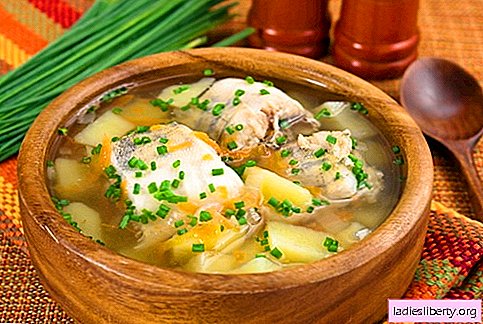
Heavy intoxication of the bodycaused by the ingestion of various types of toxins and toxic substances of different origin, leading to disruption of the entire body, is called poisoning.
Poisoning occurs when injected into the body overdue and low-quality food, exceeded the number of drugs, parts of a poisonous plant, various chemicals.
Symptoms of poisoningRegardless of the cause, there may be: vomiting, weakness and dizziness, pale complexion, nausea, abdominal pain, diarrhea, often in severe cases fainting occurs.
General principles of nutrition in case of poisoning
A diet with poisoning will help in the short term to restore the body after suffering a poisoning. Its compliance is very important because it helps to avoid the appearance of complications. In case of poisoning, the main blow is applied to the digestive system, and the entire gastric mucosa is inflamed. Therefore, a special diet during this period helps to restore the proper functioning of the stomach, intestines, and also to cope with the general intoxication of the body.
Diet food during this period for an adult and a child has the general rules:
• from the first hours of the disease it is necessary to replenish the water balance of the body;
• the transition to normal food immediately impossible, you need to do it gradually;
• eat only light, thermally processed food;
• in order to prevent injury to the inflamed walls of the stomach and intestines, nutrition involves eating frayed or finely chopped food;
• no earlier than in two weeks, you can return to normal and habitual diet.
As soon as the main symptoms of the disease subside, appetite appears. Eating with poisoning is often necessary, but in order not to overload the stomach, the volume of food taken should be small. Also should remember:
• it is necessary to exclude intake of various fats in an organism. This is due to the fact that a lot of energy is spent on the digestion of fats, they cause the body to saturate quickly, and the process of indigestion is only intensified. The best option for fat is considered to be vegetable and butter, which are recommended to be added to food.
• It is necessary to limit, but not refuse to accept carbohydrates. For a poisoned person, their volume is reduced to 300g per day. Incoming carbohydrates, especially complex ones, only enhance the course of fermentation, affect the mucous membranes of the stomach and intestines, swelling increases, and recovery itself only slows down. But for the formation of glycogen in the liver, all types of carbohydrates are simply necessary.
• The ban does not apply to protein intake. A significant amount of them is lost, so it is very necessary that half of the substances entering the body be proteins. The standard volume for an adult patient is at least 70g per day.
• Accepted food should be easily digested and sparing: frayed or mushy. And the transition to coarse foods should be gradual. All food is recommended to steam, simmer or bake in the oven.
Compliance with the diet will allow you to quickly reduce the painful symptoms and gradually improve the digestive process, and most importantly, to reduce the intoxication of the body in a short time.
Products, substitutes prohibited on a diet with poisoning
The diet for poisoning is very strict.
Therefore, from the power necessary to exclude A number of everyday products:
• canned or fresh legumes;
• cabbage and all dishes from it;
• fatty foods, all canned oil;
• exclude fried, smoked, salty, pickled food;
• drastically reduce the amount of salt, sugar, seasoning and spices used in cooking;
• exclude raw vegetables and fruits;
• any semi-finished products;
• sauces, ketchup, mayonnaise;
• all kinds of sweets and pastries;
• drinks: sweet and soda, alcohol;
• if the poisoning is accompanied by diarrhea, then remove milk from the diet.
In this difficult period for the organism, all requirements are imposed on all food. All received food should be gentle and light, have an optimal temperature, should not provoke an excessive production of enzymes, have enveloping properties, and should not cause fermentation.
To the process of restoring the body went correctly, in diet menu in case of poisoning must include:
• soups with lean broth made from various cereals or vegetables. It is allowed to use in cooking broth on meat or fish base, but crushed in half by water.
• Mashed, lean fish, meat. When cooking meat puree, meatballs or meatballs for a couple of minced meat, it is recommended to scroll twice.
• Milk products: low-fat cottage cheese or one-day yogurt, yogurt without the inclusion of additives.
• Liquid cereal porridge cooked in milk. But the milk in the cooking process is better to dilute with water by half.
• Eggs (eg, steamed omelette).
• Boiled and finely chopped vegetables or fruits.
• Not sweet biscuits, soaked homemade croutons.
• Bread only from wheat varieties, not fresh baking.
From the first hours of the disease, a diet with poisoning involves feeding a large volume of fluid to the affected person, since the body is in a dehydrated state. Its increased volume helps the body to replenish the lost volume of fluid during vomiting, diarrhea, accelerates the release of toxins. It is necessary to drink often and in small portions. If fluid intake is large at a time, it can cause nausea and vomiting. They will cause muscle spasm in the esophagus and stomach, if drinking is cold. The liquid must be warm.
Recommended to drink
• mineral water, but without gases;
• ordinary boiled water or table, with the addition of lemon juice;
• mors;
• compotes of apples, pears;
• decoctions of wild rose, sea buckthorn, dill, chamomile, rice, well and quickly help restore the body's deficiency of vitamins, minerals and salts;
• black and green tea, but without sugar. If you really want sweet, you can add honey to drinks. Tea, despite all its useful properties, it is recommended to drink from the second day, when the symptoms of poisoning subside.
If the poisoning is not severe, then drinking fluid will help replace the venous flow of drugs.
Sample diet menu for poisoning
Diet in case of poisoning is a special dietary food that has a healing effect and makes it possible in a short time to normalize the work in the stomach and intestines, to reduce general intoxication.
Diet poisoning initially assumes full starvation. It protects the digestive organs from the increased load. Refusal to eat on the first day will benefit the body. Such an exemplary menu and knowing the products allowed during intoxication, you can create another one.
First day: the presence of heavy drinking, and food intake is completely excluded. Food will only irritate the stomach and intestines, causing additional discomfort. It is necessary to begin to otpaivat the patient from the minimum volume of liquid: from one tablespoon. Gradually during the day, this volume increases to one cup. It is necessary to ensure that the patient drank every hour and a half.
Second day: in the morning you can offer tea or a decoction of rice, if there is diarrhea. Fresh pumped juice helps to stop diarrhea.
Lunch: homemade crackers. To make them, cut white bread into small pieces and dry in the oven. As a drink, you can offer a weak, warm tea or homemade, savory stewed fruit.
Dinner. Liquid, cooked without sugar and salt porridge, for example, oatmeal. Its volume should not exceed 100g.
The third day: in the morning you can offer white rice cooked in vegetable broth without salt and seasoning with white bread (not fresh pastries).
The second breakfast: apple puree.
Lunch: mashed potatoes with low-fat fish fillets. Fish must be steamed.
Lunch: salad with boiled carrots.
Dinner: sugarless fruit compote, homemade crackers.
Fourth day: In the morning you can cook chicken broth. If the condition of the patient is not serious, then add some potatoes to it.
Second breakfast: biscuits or cottage cheese casserole.
Lunch: steam chicken cutlets.
Safe, baked vegetables.
Dinner: unsalted crackers and mint green tea.
After three to four days, usually the patient's condition returns to normal, appetite appears, but it is still too early to start a normal diet. The symptoms of poisoning may repeat: general malaise, abdominal pain, diarrhea, vomiting, because during this short period of time the mucous in the stomach and intestines does not have time to recover.
In the menu by the end of the first week you can include in the diet:
Breakfast: various jelly, liquid porridge.
Second breakfast: egg omelette on semolina (without milk).
Lunch: weak chicken broth, fish, mashed potatoes, tea or broths.
Dinner: porridge.
In the second week poisoning diet includes the introduction of light vegetable soups (but without legumes and cabbage), milk-based porridges for sugar-free (with honey), steamed vegetables and baked fruits, confectionery in moderate amounts, meatballs and meat souffle, egg white , a small amount of milk, low-fat and grated curd. You can gradually enter into the menu fresh vegetables and fruits in small portions. If the main symptom of the disease was diarrhea and it passed slowly, then with the introduction of them into the menu, there is no need to hurry. By the beginning of the third week, you can gradually proceed to the usual diet of food.
Diet for poisoning should be strictly followed by the sick. To expand the food menu, to introduce new products into it should be carefully and gradually, in small volumes, without overloading the stomach. Such a diet will help significantly alleviate the condition of the patient and speed up his recovery.
It is necessary to pay attention to the fact that if a diet in case of poisoning by the end of the first week does not bring an improvement in the patient's condition, an urgent consultation with a specialist is required.
Important points of nutrition for people with poisoning
Diet for poisoning is based on several rules:
• on the first day, full starvation with heavy drinking is expected. This contributes to the accelerated release of all toxins from the body.
• Drinking regime should be regular: for every hour or hour and a half to drink at least 200ml of liquid. The minimum daily volume of fluid should be 2 liters.
• The entire diet should be light and digestible food.
• The consistency of all food: liquid and semi-liquid.
• All food must be boiled or steamed.
• Take only warm (not hot or cold) food to eliminate irritation of the gastric mucosa.
• The volume of a single meal should not exceed:
- on the first day: up to 200ml of liquid;
- on the second day: 150-200ml of broth, 100ml of liquid puree and up to 200ml of liquid;
- on the third day: up to 300 ml of liquid porridge, up to 200 ml of broth, 4 biscuits;
- on the fourth day: up to 400 ml of broth, up to 100g of boiled fish, up to 250g of boiled rice, up to 300g of casseroles of cottage cheese, up to 6 galettes.
• Eat often. The frequency of meals per day: 6-7 times, that is, every three hours.
• Food during intoxication should be fractional.
• The daily amount of food should not exceed 1000 kcal.
• The daily volume of all fats - no more than 70g.
• In the first week of nutrition, the basic ration should be foods rich in protein, vitamins and essential minerals.
For full recovery of the body essential vitamins: A, C. Sources of retinol (vitamin A) have always been broths and homemade sea buckthorn and rosehip compotes. A sufficient amount of it is contained in the yolk of the egg, cheese (use only grated), in sweet pepper (use only stewed or boiled).
Sources of ascorbic acid (vitamin C) are homemade fruit drinks and fruit drinks from berries, cooked with sea buckthorn, black currant. The required amount of vitamin C is in the potato. To increase the content of ascorbic acid in food, it is necessary to reduce the time of its heat treatment, eat food immediately after cooking. For example, raw potatoes should be dipped in boiling water or cooked in a uniform. Vitamin C with this preparation, it will save 30% more.
The main method of treatment when receiving intoxication is considered strict adherence to diet.
First of all, the diet is necessary to reduce the body's fluid loss, to create optimal conditions in the stomach and intestines, to provide the body with the necessary vitamins and proteins in order to avoid its depletion.











